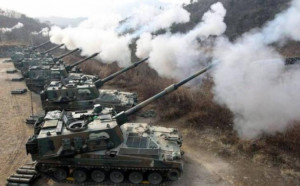
– Is the government of South Korea ready to sincerely seek a turning point in inter-Korean relations through dialogue and talks and through renewed contacts and exchanges, or does it intend to continue to resort to confrontation, such as the distribution of agitational leaflets?
– Is the government of South Korea ready to sincerely work on creating a lasting peace on the Korean peninsula, or does it intend to further escalate tension?
– Is the government of South Korea ready to sincerely work towards consolidation and unity, guided by the principle of using the strength of the Korean people to solve their problems on their own, or does it intend instead to work towards the so-called “unification of social systems”, while actually striving for the opposite?
Then on January 10, 2015, the DPRK requested that the USA reconsider its “anachronistic and hostile relationship with Pyongyang, in order to avert the threat of war, reduce tension, and create a friendly atmosphere on the Korean peninsula”. This was released in a message broadcast by the Korean Central News Agency, North Korea’s state news agency.
For this to happen, the USA should “temporarily put a halt to carrying out military manoeuvres on and around the peninsula”. If the United States agrees, Pyongyang will “commit itself to temporarily stop nuclear testing”. Pyongyang declared that it was ready “at any time to engage in bilateral negotiations if ever the USA were to be interested in discussing such a proposition”.
North Korea insists that the American manoeuvres in South Korea are the “main source of tension on the Korean peninsula and across the whole of north-east Asia”. “It is time for the USA to do the right and intelligent thing in the interests of peace and stability in the region”.
There are two aspects to the North Korean statement. The first is that it is an authentic demand for those concerned to precisely define and lay out their position. The second, the demand to cease military exercises, is as realistic as expecting the unilateral nuclear disarmament of North Korea itself. The current president of South Korea, Park Geun-hye, is not in a position to brashly demand a review of existing agreements regarding military cooperation.
Following this it was not wise of the South Korean Ministry of National Defence to declare that the country’s armed forces will continue to carry out its yearly military manoeuvres with the USA. “So long as US-South Korean joint military manoeuvres maintain a defensive character, North Korean demands for them to stop will remain groundless” said the Press Secretary for the Defence ministry Kim Min-seok. Kim added that a war can happen in a wide variety of circumstances; therefore an army must always be ready by conducting regular military exercises.
The position of the USA in this regard was also expected. Spokesperson for the State Department of the USA, Jennifer Psaki, stated that Seoul and Washington could not accept Pyongyang’s proposal to suspend their nuclear testing in exchange for the USA and South Korean cancelling their join military exercises, since the North’s proposal is nothing more than an implicit threat. According to Psaki, Pyongyang’s attempt to link routine military exercises, which have been going on for 40 years, with the problem of nuclear testing is inappropriate. The State Department spokesperson underlined that nuclear testing is a violation of multiple UN Security Council resolutions.
Since January 8, the South Korean Navy has carried out its first artillery strikes of the new year in the waters of the Eastern(/Japanese) and Yellow Seas, and further joint military exercises have begun as planned.
Konstantin Asmolov, candidate of historical sciences, senior researcher at the Institute of Oriental Studies of the Russian Academy of Sciences, exclusively for the online magazine “New Eastern Outlook”.
